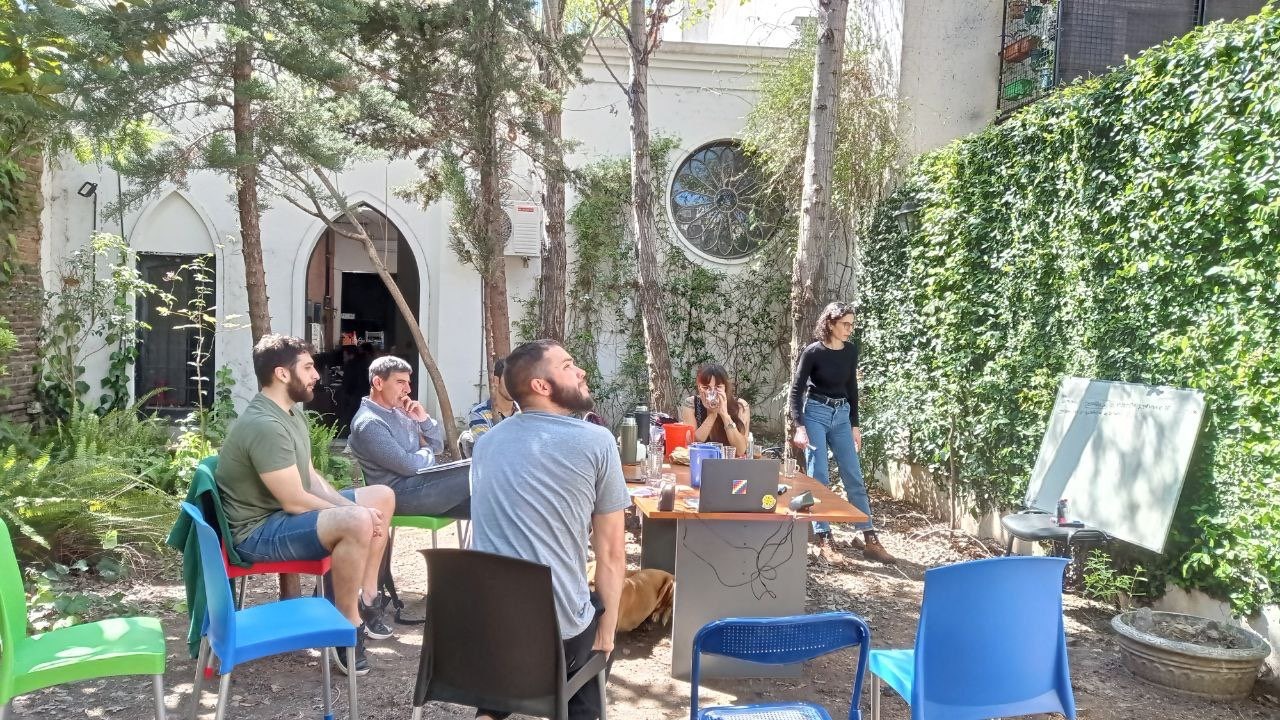Argentina, Meet CoopCycle!

Platform work—the sharing of a digital platform to complete a task or provide a service—has piqued the interest of organized labor and various social movements around the world. Scholars are assessing digital labor platforms and their analysis can encourage workers to gain associational power. But activist organizations, universities, social organizations, and governments also pursue another strategy: they work to advance platform cooperatives, a movement premised on democratic governance and community ownership in the digital economy.
In this post, I provide an introduction to my fellowship project for the Institute for the Cooperative Digital Economy (ICDE) at The New School. Using the work of American scholar Erik Olin Wright and the feminist duo using the pen name J. K. Gibson-Graham, I suggest that platform co-ops can help people band together to use resources and make a living together. They could change how people conceive of the economy altogether.
CoopCycle is one such cooperative. It is a federation of bike delivery co-ops as well as a digital cycle logistics infrastructure. Currently, the federation has about 70 member collectives, the vast majority of which are in Western Europe. The software was created by a volunteer organization. To ensure democracy, the organization formed a federation, which serves as a precursor to a multi-stakeholder cooperative. The courier collectives chose their first board in 2021.
The availability of delivery software for federated cooperatives is unquestionably a milestone in this ecosystem. CoopCycle is distinct from non-cooperative platforms due to its Coopyleft license and federalized structure. For example, the fee for servers, maintenance, and support is decided democratically among the federation’s cooperatives. While each cooperative is unique, they all guarantee better working conditions.
One of the benefits of digital platforms is scalability, or the ability to adapt and respond to changes in stakeholder numbers, types, and locations. Given that corporate platforms rely on network effects to shape monopolies, it makes sense to think about how platform co-ops can grow and thrive. Federated resources and cooperative cooperation can assist in amplifying anti-capitalist structures and practices, thus, reshaping power relations.
But scaling CoopCycle and other platform co-ops to other regions is not automatic. How big can social change be? Should platforms grow in size despite the known threats to democracy and identity? Should scale be approached in terms of replicability and dissemination or adaptability and re-territorialization instead? How to strengthen a transnational and socially empowering CoopCycle in Europe and Latin America?
With these questions in mind, I went out into the field to investigate the implementation of CoopCycle by the Argentine Federation of Technology, Innovation, and Knowledge Worker Cooperatives (FACTTIC). FACTTIC is a federation of Argentinian tech worker cooperatives with nearly a decade of inter-cooperative and collaborative work experience. “The localization [of CoopCycle] was an idea, a project, and we requested state funding,” one FACTTIC member explained. “So, when we received the grant, we thought ‘ok, should we get started? Should we bring CoopCycle?’” The Argentine process, which originated from the work of a federation partially funded by the state, appeared to be quite distinct from the French association’s European trajectory. In Argentina, what was the role of the state and the federation? How did their different logics work together? What were the benefits, drawbacks, and limitations of CoopCycle in Argentina?
I identified several major factors affecting local CoopCycle implementation. The availability of the software was a key promotional factor that was “inherited” from the European experience. Several other contextual conditions worked in favor of CoopCycle Argentina: The cooperative legal framework did not seem to be a barrier. The relatively big and dense cooperative movement could embrace the nascent platform co-op. Courier co-ops can easily advance in a highly urbanized country like Argentina, which has bike infrastructure in the main cities. However, these contextual conditions also posed some challenges and limitations. For instance, urbanization processes in Latin America have been grounded in broader structural inequalities that generate a lack of services and a dispersion of the population in suburbs.
The organizational resources of the local organizer, FACTTIC, were also critical. After several years of collaboration and exchange with the European team, CoopCycle Latinoamérica was launched in December 2021. Argentina, Chile, Mexico, and Uruguay are among the countries represented in this network. Aside from that, also the state has been an important player in the process, providing the two main grants that have funded local implementation to date. Participation in and network formation with other social and solidarity actors such as cooperative federations, universities and state bodies, foundations and non-governmental organizations, cooperative financial institutions, and cooperatives from other activity sectors strengthens the local process. Within these networks, economic and political resources circulate, allowing for scalability, knowledge diversification, and assistance.
Despite the many positive aspects of CoopCycle, cooperativism is always complicated: governments and societies have prejudices against co-ops and alternative economic projects. When we consider technology, the situation worsens even more. Against such distrust, the emancipatory social sciences generate knowledge in order to help establish a post-capitalist social order. My research as an ICDE fellow this year, therefore, is focused on determining and communicating CoopCycle’s cooperative advantage for workers and communities in Argentina.
What are your thoughts on the role of platform cooperatives in establishing a more equitable and democratic Latin America?
Photo credit: Facttic, CoopCycle workshop